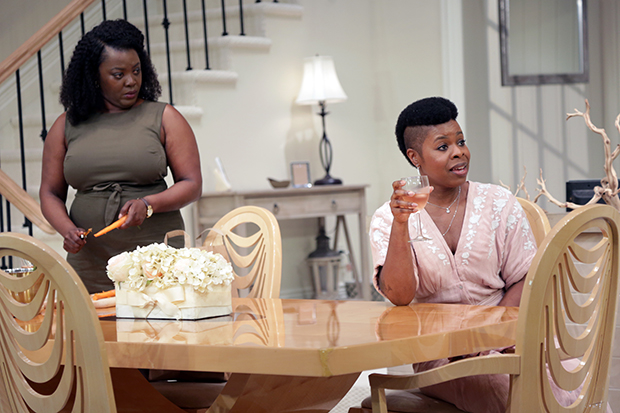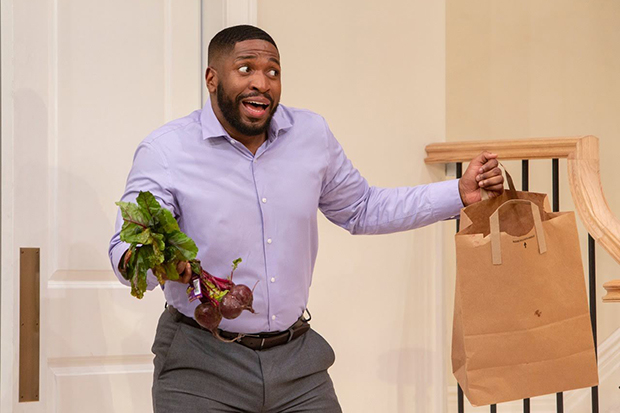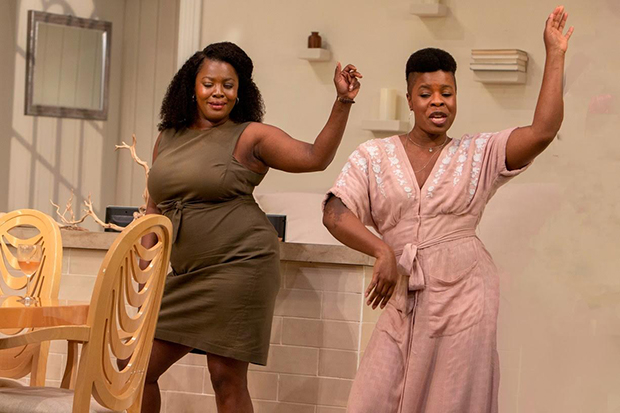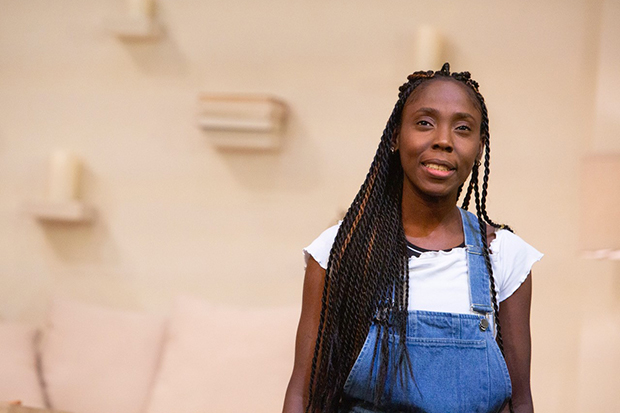2019 Pulitzer Prize Winner Fairview Gets a Second Showing

(© Gerry Goodstein)
This year's winner of the Pulitzer Prize in drama is Jackie Sibblies Drury's Fairview, which had a two-month run at the 73-seat Soho Rep. last summer — meaning only a handful of people got to see it. Now, the play, along with its original cast, is playing a return engagement at Theatre for a New Audience's Polonsky Shakespeare Center, where considerably more people can see why this extraordinary, form-shattering, hilarious new work is truly the best play of the year.
When it opens, it looks like any number of upper-middle-class family dramas: Beverly Frasier (Heather Alicia Simms) peels carrots in preparation for her elderly mother's birthday party. Her husband, Dayton (Charles Browning), has gone to the supermarket to buy her a celeriac, while her daughter, Keisha (Mayaa Boateng) has just returned from sports practice. Her sister, Jasmine (a grandiose Roslyn Ruff), has arrived early to sip rosé and criticize. Beverly is already agitated, a state that worsens when she realizes that her attorney brother won't make the party (his flight has been rerouted). Meanwhile, Keisha is lobbying for a gap year between high school and college. These are well-to-do black people, but will class be considered when four strange white people start parsing their lives? Of course not.

(© Henry Grossman)
In the second act, we see the same scene again, but with the sound replaced by the commentary of Suze (Hannah Cabell), Bets (Natalia Payne), Mack (Jed Resnick), and Jimbo (Luke Robertson). Using fashionably correct language (they say "Latinx!"), they make racially insensitive comments as they fantasize about what their lives would be like if they were another race — specifically black. Their fantasies come true in the third act as they join the Frasier family for an explosive dinner.
Director Sarah Benson brilliantly stages this controlled chaos, with Raja Feather Kelly choreographing the fabulous pandemonium. Montana Levi Blanco achieves racial fetishist pageantry in his third act costumes, with each new family member entering the space like contestants stepping onto the runway of RuPaul's Drag Race. Category is: Why it gotta be black?
This is a creative team that takes the word "play" seriously, and when we see the four-tier shrimp cocktail and giant basket of rubbery cornbread (ludicrous props by Ryan Courtney), we cannot help but laugh. Fairview gloriously shows that gravity and levity can coexist, and often fuel each other.

(© Henry Grossman)
That irresistible blend extends to the other design elements: Mimi Lien's set is a grander version of the one she created for the original production. It's still oppressively beige, but it now sports a mezzanine and a large fireplace. Amith Chandrashaker's lighting facilitates multiple reveals, while Mikaal Sulaiman is the MVP of the team with his aggressive, ever-present, earth-shaking sound design.
Not to be outdone, the actors deliver performances that are both truthful and outlandish. Practically tremoring with anxiety, Simms plays a woman in serious need of a Xanax. Cabell's sincerity as Suze, the white ally who says everything correctly (but still isn't much help), only serves to highlight her ridiculousness. Boateng gives one of the bravest performances I've ever witnessed, speaking directly to the audience in a supremely uncomfortable finale.
I didn't write much about the ending of Fairview in my initial review because I didn't want to spoil it. But now that the play has been around for a year, I'd like to comment on the most memorable scene in a play overflowing with remarkable moments. Just as Drury targets the end of her play to a segment of the audience, I'm aiming my last three paragraphs at readers who have seen it; so if you haven't seen Fairview yet — and everyone really needs to see it — stop reading now.

(© Henry Grossman)
Fairview is a play that deploys a lot of unconventional but highly effective theatrical weapons, but none is more impactful than Keisha's final monologue, in which she asks all of the white audience members to come onstage to "make space" for her and her family in the audience. Drury knows that this quasi-segregationist experiment is just a fantasy, with Keisha fretting that it would be "too hard," and worrying about all the people "caught in between" the neat boxes of "white" and "of color." Still, if we cannot ask "what if?" in the theater, where can we?
Drury asks her audience to make a choice with our bodies, and that request radically shifts the dramatic tension from the stage to the house. Will we accede? Will we reject? Will we rebel? The white off-Broadway audience mostly obliged at the performance I attended, although the refuseniks made the finale that much more thrilling, as Boateng looked into their eyes and asked them to move.
I chose to walk onstage, although even this momentary cessation of space pricked me in a way that I could feel in my throat — because I didn't really want to go. So why did I do it? Was it the bandwagon effect? A fear of being seen as insubordinate at work? A fear of being judged as racist? I'll be mulling over these possible explanations for a long time, but they all involve an element of shame. I wondered how many of the white liberals standing next to me onstage felt the same way. Of course, non-liberal white America is not like an off-Broadway audience — and it won't be shamed into making space.










